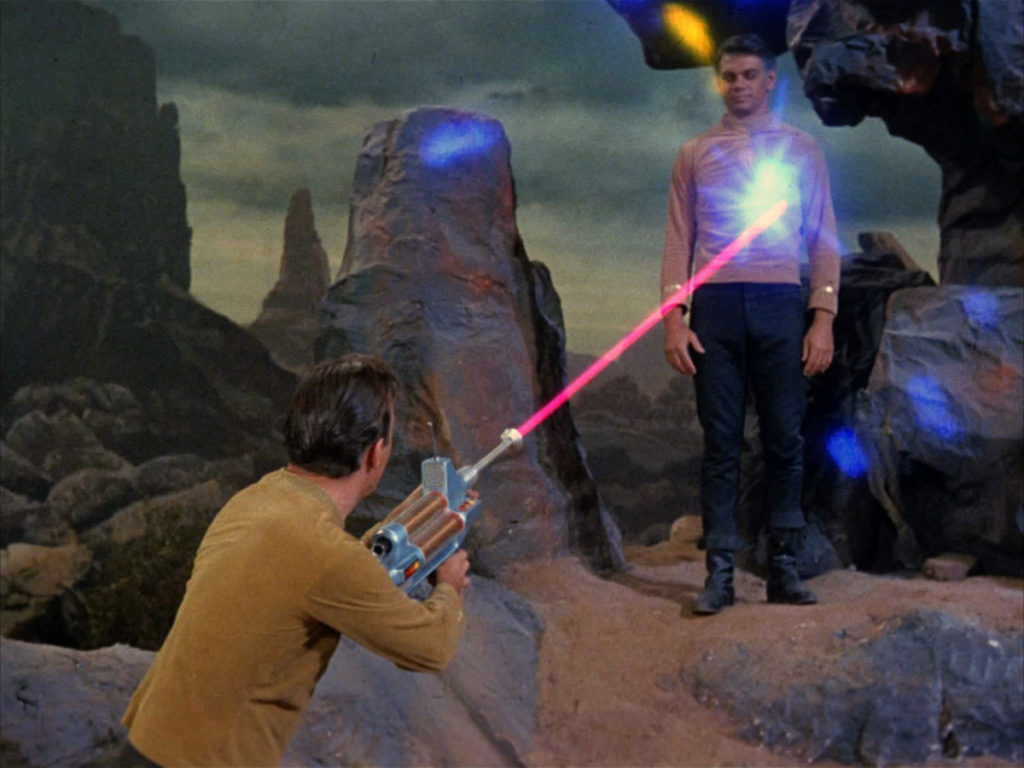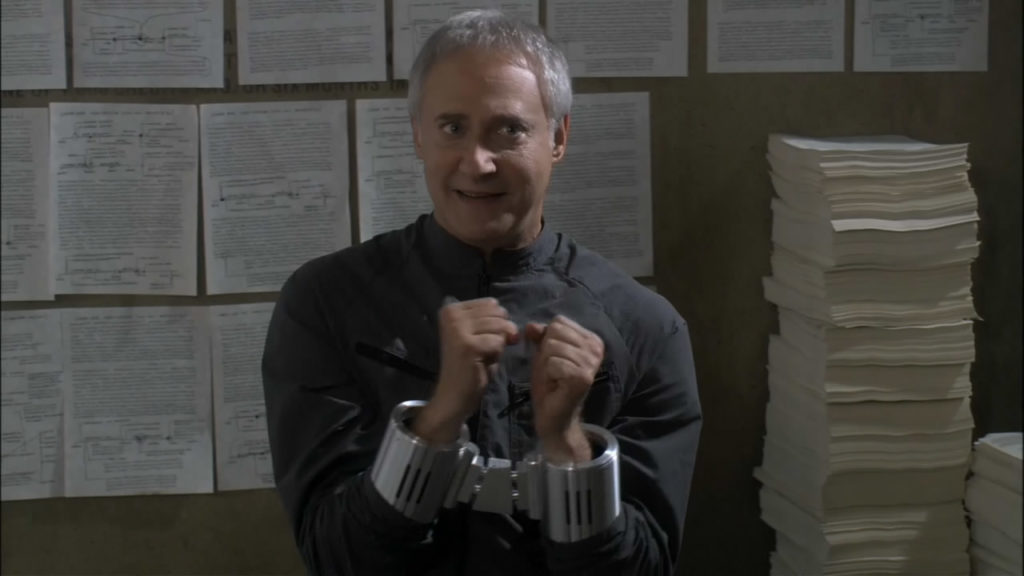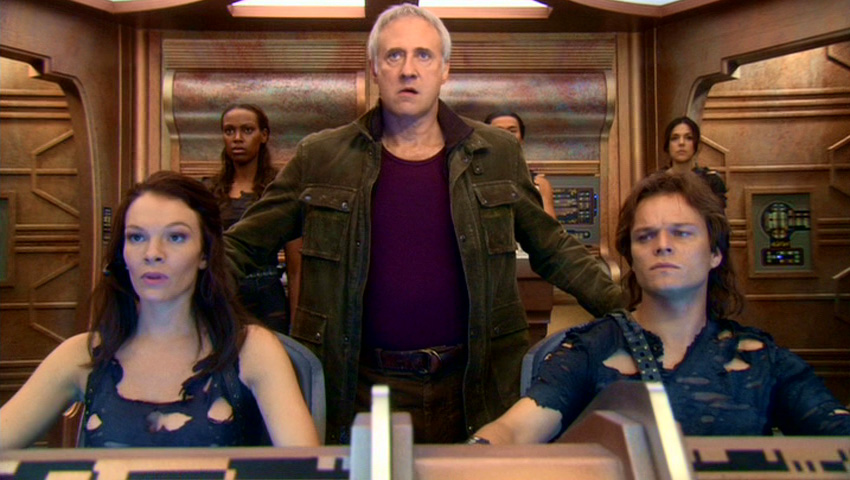As I mentioned in our inaugural post, central to the discussion of Star Trek Into Darkness is the question of who exactly Benedict Cumberbatch is playing. The rumours forever have been that it is Khan, the villain from the second Star Trek film and the original series episode “Space Seed,” which Sith-bot will review tomorrow.
I want to first look at another possibility raised by Karl Urban, either in a deliberate misinformation campaign (aka “f@#$ing with fanboys on the internet) or a possible leak when he talked about Cumberbatch’s character being Gary Mitchell from the original series episode “Where No Man Has Gone Before” (and because it fits thematically) we’ll look at that episode.
And then we’ll look even further back (or forward? prequels infuriate me) into the history of Khan with three of the best episodes of Star Trek: Enterprise, the ill-fated prequel series about the first starship Enterprise. The series as a whole, in my opinion, was a terrible waste, as they spent three seasons meandering before they actually started making good episodes (you could make the same complaint about Next Generation and Deep Space Nine, but those both had the fortune of having many good seasons afterwards to make up for their early meanderings.)
Where No Man Has Gone Before
What happens when you give a man the power of a god? And what happens when that man has an ongoing inferiority complex with Captain James Tiberius Kirk?
At the edge of space, the Enterprise recovers the log of the SS Valiant, a ship long lost, who had encountered the great Galactic Barrier and been destroyed because of it. (Trek aficionados will recognize this is the same barrier in Star Trek V: The Final Frontier aka “What does God want with a starship?” and also the Valiant will make a reappearance in a new iteration during the Dominion Wars in Deep Space Nine, crewed entirely by Red Squad cadets. )
The Enterprise also encounters the barrier, enhancing helmsman Gary Mitchell’s latent psionic abilities, including telekinesis, the ability to transmute matter, and so on. The episode culminates with a fight between Kirk and Mitchell.
While the plot is straightforward, the commentary is complex. This is one of several episodes from season 1 of Trek which ask the same basic question: what happens when you give people more power? In the case of Mitchell, or Charlie X, they have personal breakdowns that put the ship and her crew at risk. In the case of Khan, who was born to wield the power, he’s able to control himself and it, but it is equally as corruptive.
Enterprise: The Augment arc
Notable first for bringing back Brent Spiner to play Arik Soong, a progenitor of Noonian Soong (Data’s creator), it’s a nice way to mix old and new. Also notable is that these three episodes both obliquely and specifically reference Space Seed and Khan.
Arik Soong, brilliant scientist, sits rotting in a California prison cell, when he is approached by Capt. Archer. A Klingon Bird of Prey has been attacked, hijacked, and its crew and captain (played by JG Hertzler aka Martok from Deep Space Nine) murdered and jettisoned into space. The Klingons found human DNA on the bodies– but not just any humans. The DNA came from a colony of “Augments,” frozen embryos preserved from the time of the Eugenics Wars, which Dr. Soong had stolen and then raised as his own children. With him in prison, it appears they are running amok and will attempt to “liberate” their unborn “brothers and sisters” from Cold Station 12. With Soong in tow, Archer and crew must stop them.
Hijinks ensue. Lots of battles, torture, kidnapping by Orion slavers, and so on.
These episodes are great, and represent what might have been with Enterprise if they hadn’t spent three seasons fiddling around with the “Suliban” and the “Xindi” and a bunch of other races we didn’t care about and that just got retconned into existence. We wanted Klingons, Andorians, Vulcans, Romulans, Orions, Gorn. . .and Augments. When Enterprise stuck to those, it was generally watchable.
Oh, and did I mention Levar Burton directed the third episode? Nicely done.
But going back to our original theme, we saw the Augments for what they truly were: violent, aggressive, ambitious, and utterly inhumane/unhuman. What can unravel our humanity? Power. And the willingness to use that to terrible ends.
Malik, one of the Augment leaders, quotes Nietzsche to Archer: “Humanity is something to be surpassed.” Or is it? The real story in this arc is not the journey of the Enterprise or the Augments, but a personal journey of Arik Soong. He goes from believing that humanity needed to be improved by use of radical genetic engineering to seeing that humanity is not prepared for that sort of unbridled power. And we see him then, at the end of the arc, turn away from genes as a method to create a perfect man, but to “perhaps cybernetics,” saying it might take a generation or two. *wink*
Other major audience winks in this episode include discussion of Khan and the Botany Bay, and whether or not it even exists or is just a fairy tale.
Whether or not Cumberbatch is, in fact, Khan, these episodes bear exploring and refreshing before Star Trek Into Darkness hits theaters in two weeks. Whatever powers Cumberbatch has obtained that he will use, he faces the same challenges as Gary Mitchell, the Augments, Khan, etc. He has somehow lost his humanity in the quest for power.


